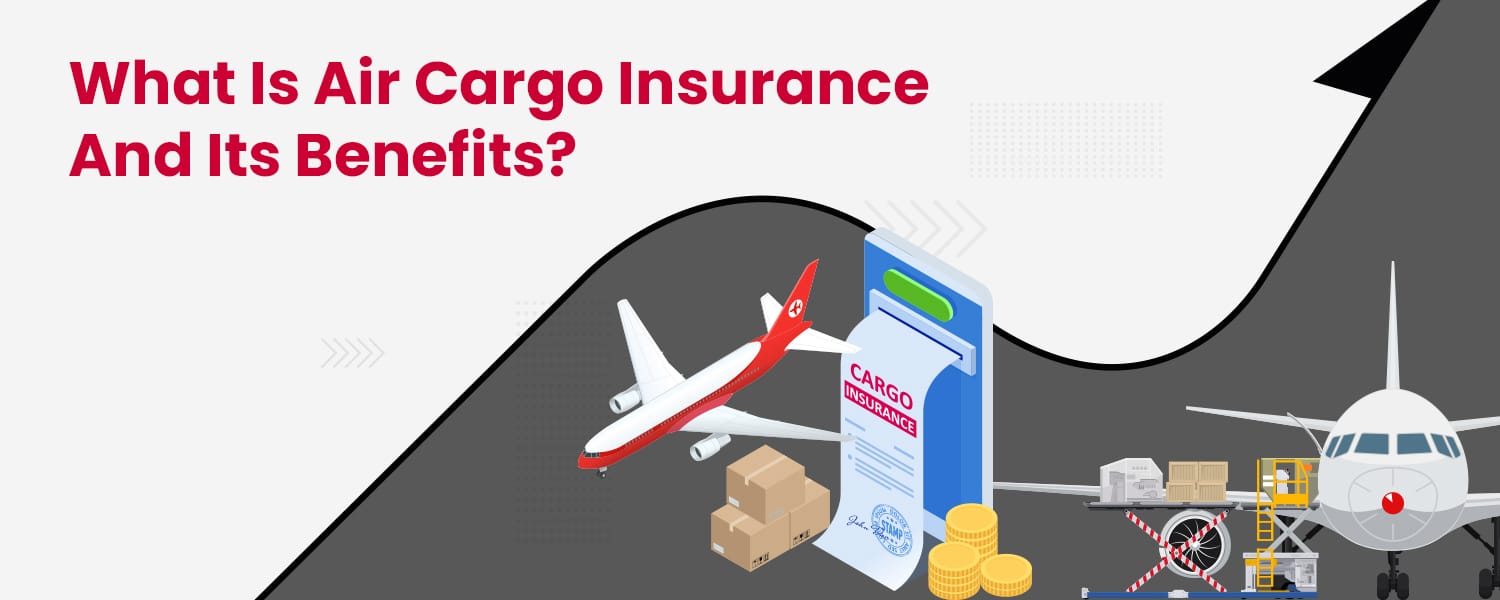Your cargo is susceptible to the hazards of loss or damage while it is in transit. The carrier’s responsibility is typically insufficient to cover the value of the freight if a shipment is lost at sea due to the sinking of a container ship. So, it is crucial to consider air cargo insurance for your shipments. You can avoid wasting time and money if your shipment is lost or damaged. And in this post, you’ll learn more about air cargo insurance, including its advantages, types, and coverage.
What is Air Cargo Insurance?
A buyer or seller of goods carried over the air is protected by air cargo insurance from loss, damage, and, in some situations, even shipment delays.
Most air freight businesses offer carrier liability insurance, an essential requirement for all freight but often provide minimal coverage.
Air cargo insurance will shield you from financial loss if your goods are harmed or lost. It reimburses you for the total price of your insurance if a covered incident damages your freight. Typical exclusions include piracy, acts of war, terrorism, cargo abandonment, and natural disasters. Additionally, it differs from the carrier liability and insurance plans provided by specialized cargo and freight insurance companies, freight forwarders, agents, and big brokers.
What are the benefits of Air Cargo Insurance?
If your consignment is harmed or lost en route, the main benefit of air cargo insurance is that it lessens your financial loss. The small investment you make (sometimes referred to as the premium) assures you when your products depart your warehouse.
It also offers your business the advantages listed below:
- You avoid unplanned stops in your financial flow.
- If profits are covered, profits are still made.
- The claims process is effective due to the competent service.
When do you need Air Cargo Insurance?
Even if it isn’t required by law, getting air cargo insurance for your shipment is typically smart.
There are also other things to consider, like the weather and traffic. Your freight is at significant risk while it travels through several hands, vehicles, and ports. Therefore, the longer it is exposed to risk, the more likely it will be lost, stolen, or destroyed.
Remember that even if the carrier is held legally liable, their liability is typically limited to less than the cost of commonly transported goods. As per COGSA, the Carriage of Goods by Sea Act, ocean freight carriers are only liable for up to US$500 per package/shipping unit or the real value of the goods, whichever is less.
Based on these numbers, you could still suffer a financial loss without cargo or freight insurance. But there are situations when it is not required. Reviewing your contract’s inconveniences is essential because some absolve you of liability at specific points in the shipment process. You can save money by establishing the full scope of the contract and just purchasing insurance when necessary.
Types of Cargo Insurance
The two primary types of cargo insurance are land and marine (which also covers air cargo).
Land Cargo Insurance
This insurance covers trucks and other light utility vehicles that move cargo across the land. It is frequently used for domestic freight because it is constrained within a nation’s borders. Other land freight transportation hazards, such as theft and collision damage, are also covered.
Marine Cargo Insurance:
Marine cargo insurance, which safeguards items transported via water, is a near cousin of air cargo insurance. This insurance, which primarily applies to international trade, covers air and ocean freight. It safeguards aircraft and ships from harm by loading and unloading, inclement weather, mishaps, and other dangers.
What types of damage are not covered by air freight insurance?
Cargo insurance excludes risks and problems that the shipper has substantial control over. As a result, policies often do not include:
- Damage to your products if it can be proven that inadequate packaging was the cause of any damage.
- Damage brought on by faulty items. If the carrier can demonstrate that faulty items inside your cargo brought on the damage, the policy will not compensate you.
- Freight of particular types. All insurance companies do not cover hazardous materials, certain electronic products, and other very valuable or fragile items.
- Some modes of transportation are also available. Some insurance may only cover your cargo transported by ship, plane, or vehicle.
How to make a claim?
Carriers are assumed not to be responsible for any loss or damage unless otherwise proven. Their limitations are expressly specified in the Bill of Lading, which is permissible language, and they would also take all reasonable steps to limit or prevent their liabilities. You must thus demonstrate that they were careless with your cargo or that the damage or loss happened while they controlled it. And if you are successful, the insurance provider will pay you because your claim is valid.
You’ll also need to locate the following details about your shipment to submit a claim:
Your insurance carrier provides the number on the inventory list. You can request an inventory list if they don’t give it to you.
- Room of the item: This refers to where the item was before it was packaged.
Please describe the item in as much detail as possible, such as its size, weight, visual signals, and any related accessories.
- Damage: Describe the location and extent of the damage to your shipment.
Age of the item and the date of purchase – If you don’t have any production records, estimate the age of the item and the date of purchase. Remember that the ages and dates of purchase will vary for used products.
- Original and replacement costs: Calculate the replacement costs by writing down the original costs as carefully as possible and looking up the cost of a similar item.
Indicate the cost of your item or the amount listed in the inventory if your claim is for loss when stating the amount of your claim. You include the repair cost only if your claim is for damage to the item. Your policy’s underwriter might also request that you provide documentation of ownership or worth.
Conclusion
Increased risks are brought on by delays, damage, loss, or cargo theft. Through the purchase of the appropriate cargo insurance, shippers can lower their risks. Even though it is not necessary, cargo insurance can give the shipper peace of mind and protect their investment. However, shippers must be mindful of these drawbacks because benefits have restrictions.
You should only trust an established business that has consistently delivered excellent eCommerce shipping and insurance outcomes, and NimbusPost ticks all the right boxes. NimbusPost provides all eCommerce sellers with an AI-driven logistics system, a shipping rate calculator, hyperlocal shipping, and insurance for secure shipping.




